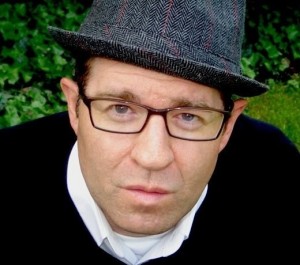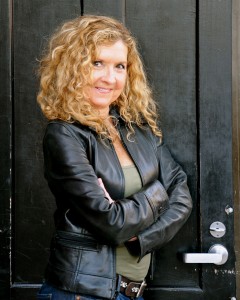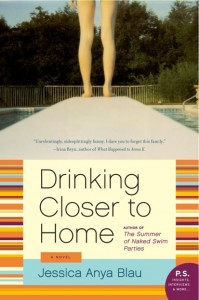 Alan Heathcock‘s fiction has been published in many of America’s top magazines and journals, including Zoetrope: All-Story, Kenyon Review,VQR, Five Chapters, Storyville, and The Harvard Review. His stories have won the National Magazine Award in fiction, and have been selected for inclusion in The Best American Mystery Stories anthology. VOLT, a collection of stories published by Graywolf Press, received starred reviews from Library Journal and Publishers Weekly, was named by Publishers Weekly as a debut to watch for 2011, a New York Times Editors’ Choice, featured as one of three notable debuts to watch on The Huffington Post, selected as a Barnes and Noble Best Book of the Month, as well as for inclusion in the Barnes and Noble Discover Great New Writers series. Heathcock is currently a Literature Fellow for the state of Idaho. A Native of Chicago, he teaches fiction writing at Boise State University.
Alan Heathcock‘s fiction has been published in many of America’s top magazines and journals, including Zoetrope: All-Story, Kenyon Review,VQR, Five Chapters, Storyville, and The Harvard Review. His stories have won the National Magazine Award in fiction, and have been selected for inclusion in The Best American Mystery Stories anthology. VOLT, a collection of stories published by Graywolf Press, received starred reviews from Library Journal and Publishers Weekly, was named by Publishers Weekly as a debut to watch for 2011, a New York Times Editors’ Choice, featured as one of three notable debuts to watch on The Huffington Post, selected as a Barnes and Noble Best Book of the Month, as well as for inclusion in the Barnes and Noble Discover Great New Writers series. Heathcock is currently a Literature Fellow for the state of Idaho. A Native of Chicago, he teaches fiction writing at Boise State University.
Award-winning author of VOLT. For more information, visit alanheathcock.com.
Q (Meg Pokrass): Alan, what is your feeling about the mentor experience as a writer?
I think having a mentor was the very best way to learn, to the point that I’ve changed the way I teach fiction from a traditional workshop model to one closer, as much as possible in a classroom setting, to a straight-forward mentorship. I’ve decided this based on my own education. I had many years of graduate school, had sixteen straight semesters with a graduate level fiction workshop, with varying degrees of success. So I’m well versed on how workshops operate from a student’s perspective. Without a doubt the most successful learning, for me, came in the form of a professor (Robert Olmstead) calling me outside of class and discussing my work one-on-one, and doing so over an extended period of time. I was an apprentice to a master. Olmstead was generous and blunt, and because of the rigorous intensity with which he read my work, I knew he cared. I trusted him. He didn’t let me get away with anything, didn’t spare my emotions.
Writing at the highest level, from taking a draft from good to better-than-good, is an exercise in precision. I recall one evening Olmstead read through an entire story of mine, line by line, asking me questions about each choice of verb, of noun, each image and bit of dialog. It was intense. Humiliating. It was completely exhilarating. The best thing my mentor did for me was to give me the type of education that would make me not actually need him anymore. He wanted me to be the best possible version of myself (not just a clone of him), and gave me the tools to be self-sufficient. He taught the standards, precision, how to make decisions from the macro to the micro.
My education has enabled me to work effectively with editors, both when I know I should implement their input, and when I need to politely defer to my instincts, which are founded on the academic truths of writing, as taught to me by my mentor. Maybe I could’ve found my way on my own, over time, but I know the process was deepened and expedited by Olmstead’s voice in my ear. Needless to say, I’m very grateful, and try to pay this forward to my own students.
What do you do when you feel stuck or uninspired and does it work to trick the brain into working?
I take an accounting of the things in my life, the world, that make me feel something, or think something, or imagine something, intensely.
Is there a question I need answered?
Why does war exist? Why does the leaf turn to the sun? Why do I keep dwelling on that image of the flooded-out town? What’s down there in the water? Why do I find Picasso so interesting? What brings me joy? What makes me angry? What makes me swoon?
Writing, for me, is an investigation, and I always start with a question that begs to be answered. I simply give myself time to consider the questions, and don’t enter into a story until I feel myself urgently curious — I know the depth of my curiosity will break through any block. I turn inward, look to the things that make me feel most potently alive, for these things are the seed and fertile earth of drama.
Can you share with us here writing exercises you suggest to your students?
I give students this assignment at the start of most every semester: tell me five things you think are interesting. Don’t try and think what I might find interesting. Find five things you find interesting, and deliver me into empathy with your point of view. It can be anything, an image, a scientific fact, a story you once heard, something that happened to you. Anything. Look inward!
The point of this assignment is simple: we must always be interesting. Because of this, we must find the things that we find passionately interesting. Moreover, we must learn how to be persuasive in delivering the emotion, intellect, and imagination of our idiosyncratic worldview. We have no responsibility to be like others, but in order to be persuasive we must connect others to our passions. This seems like an assignment designed for non-fiction writing, yet I find it an incredible resource to fiction writers, too, who often forget that the best stories originate from the idiosyncratic core of the individual.
Do you know who they are before you write or do you find out who they are in the writing? Do you already know these people?
I’m what I call an “empathetic writer”, which means I don’t try and write about characters, but try to actually become them, to see out of their eyes, hear what they hear, think and feel as they do. I erase myself. I give the story wholly over the character. In this way, my work as a writer has a closer kinship to method acting, than, say, journalism.
In order to prepare myself for the process of becoming the character, I read fiction, poetry, non-fiction, plays, watch movies, do research, draw pictures, do anything and everything I can to enable me to better inhabit that character in that place and time and situation. I call it “reaching critical mass”. On any given day I decide the scene, or moment, I’m going to work toward. Then I do whatever I need to do to get my imagination all the way in the character, in that world, in that situation, feeling what they’re feeling, thinking what they’re thinking. I mean all the way in-not just a vague “in the ballpark” sense of things, but to KNOW what’s happening, to be there in-full, wholly inhabiting the character in the world.
This takes a lot of time and effort. Then, once I’ve reached critical mass, my job is simply to go to the computer and find the words to capture the truth of whatever I’m living in my imagination. Sometimes I don’t get it exactly correct the first time, and that’s okay. Revision for me is the process of finding the exact right words and details to capture the truth of the life I’ve created in my imagination. This is also to say that very little of my writing day is actually sitting at the computer creating new words. Others write draft after draft in order to find the character. What can I say? Different strokes for different folks. For me, I want that character, in that place, in that time, in the situation, to be perfectly alive in my imagination before I write a single word.
Some good habits for a writer?
Be patient. Abide high standards. Persevere.
Too often the whole writer’s game feels like a race. A friend gets something published and we feel like they’re getting ahead of us and we must hurry, must not let them get away…
It’s not a race. We must be patient. Nobody will take a draft out of your hands. It’s up to you to say when it’s done. We must work every day to learn our craft, gain an intimate understanding of the standards of quality in fiction, must abide anything that is objective and true about greatness in storytelling and the written word. Then, we must be patient, must keep pushing toward those standards, banging our heads against the desk, if needed, but not quitting, and never pulling up short. I worked on my book for twelve years. I watched many of my friends publish books ahead of me, and, in some cases, multiple books. I’m proud to say that I held firm to my standards, was patient with my work, and, at last, was rewarded by having the exact book I wanted to write. Not everybody can say that, and I sleep well knowing I can. I don’t know if this advice speaks to a “habit” so much as a mindset, but I think the habits follow the mindset so I offer it up just the same.
What’s the best advice you ever got?
Do not look beyond yourself for validation. Be brave enough to take yourself seriously. The moment you decide to look fearlessly inward, to take yourself seriously, you will stop imitating others and will become original.
How did VOLT find you, or you it?
Interesting question, though one whose answer is hard to parse out. On one hand, I write about my preoccupations, and for this book I particularly focused on things that scared and confounded me. I’m at the mercy of my preoccupations. Why is my mind drawn to this content? It’s the life that I’ve lived, the things that I’ve seen, something lodged deep in my DNA. It’s the stories my parents and uncles and aunts and grandparents told me. VOLT is a lot of who I am, things I abide more than influence. That said, I forced myself to peer deep into the dark recesses of my mind, actively pursuing a line of questioning that lead me to confront the things that scared and confounded me, hoping to find answers, to find scraps of light in the muck of violence and tragedy as I know it. So VOLT found me, is me, though was only written by the conscious pursuit of the truths buried deep within. I think VOLT would’ve been there, waiting for me, the way I’m convinced other books are now waiting for me, but was only found because I actually looked for it.
What’s next for you?
I’m working on a novel set during another great flood (a la Noah), and about a family floating around in their house-turned-ark who eventually get caught up in a war over the world’s last remaining visible mountain peaks.
The Fictionaut Five is our ongoing series of interviews with Fictionaut authors. Every Wednesday, Meg Pokrass asks a writer five (or more) questions. Meg is the editor-at-large for BLIP Magazine, and her stories and poems have been published widely. Her first full collection of flash fiction, “Damn Sure Right” is now out from Press 53. She blogs at http://megpokrass.com.
 Jane Bradley is Director of Creative Writing at the University of Toledo where she teaches fiction workshops and screenwriting. You Believers is her fifth book and has received numerous rave reviews including a Starred Review in Booklist. She has published a novella, a screenwriting text, and two collections of fiction. Her collection Power Lines was listed as an “Editor’s Choice” by The New York Times Book Review. She has received both NEA and Ohio Arts Council Fellowships for her work as well as three grants from the Arts Commission of Greater Toledo. She is currently at work on a new novel, The Snow Queen of Atlanta. Originally from the hills of Tennessee, she is still trying to make sense of the funny accents and the multitude of parking lots all around her in Toledo. Check out her webpage at
Jane Bradley is Director of Creative Writing at the University of Toledo where she teaches fiction workshops and screenwriting. You Believers is her fifth book and has received numerous rave reviews including a Starred Review in Booklist. She has published a novella, a screenwriting text, and two collections of fiction. Her collection Power Lines was listed as an “Editor’s Choice” by The New York Times Book Review. She has received both NEA and Ohio Arts Council Fellowships for her work as well as three grants from the Arts Commission of Greater Toledo. She is currently at work on a new novel, The Snow Queen of Atlanta. Originally from the hills of Tennessee, she is still trying to make sense of the funny accents and the multitude of parking lots all around her in Toledo. Check out her webpage at  Jessica Anya Blau
Jessica Anya Blau

